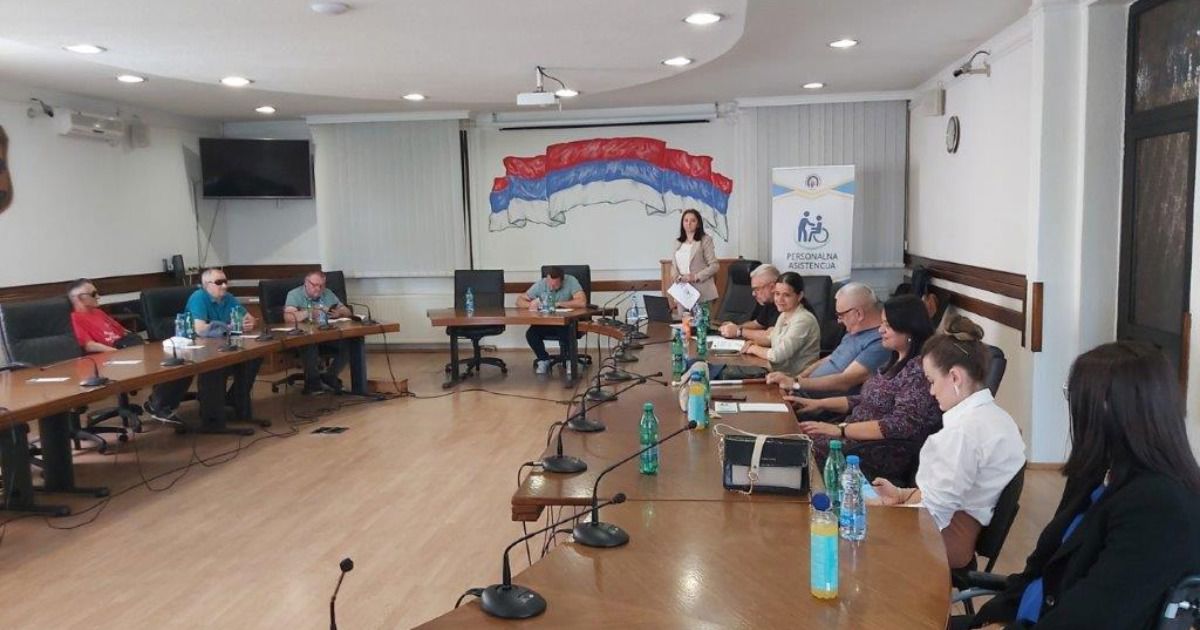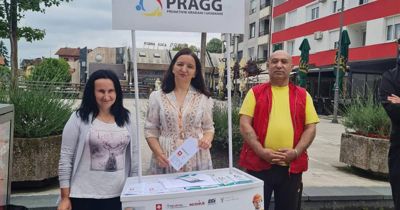
Activists from five organizations gathered around the initiative “Personal Assistance – Support That Brings Freedom”, launched with PRAGG support, received verbal support today (June 18, 2025) from representatives of the executive and legislative branches of the City of Prnjavor, as well as from the Center for Social Work, all of whom attended the event formally organized by the Association "Roma Girl – Romani Ćej" Prnjavor.
The goal of the activities implemented by the Association "Roma Girl – Romani Ćej" Prnjavor, the Association of Parents of Children with Physical and Mental Disabilities "NEVEN" Prnjavor, the Association of Parents with Four or More Children "4+" Prnjavor, the Youth Center Prnjavor, and the Organization of the Blind Prnjavor was to present their demands to local authorities during the roundtable "Introducing the Right to Personal Assistance – Challenges and Opportunities in Prnjavor."
In their remarks, the organizers presented this event as a kickoff and a crucial moment to launch a local campaign advocating for the establishment of the right to personal assistance for persons with disabilities in Prnjavor.
“We want to present our plans for the coming months, together with the everyday challenges faced by persons with disabilities and the specific benefits that the introduction of personal assistance can bring – both to the users and to the broader community. We expect the authorities in Prnjavor to support this initiative aimed at improving the status of persons with disabilities and building a more inclusive society,” said Snježana Mirković, the activity coordinator, in her opening remarks.
At least verbally and through promises made by local officials, support was given to the organizations involved in the campaign, which is part of the PRAGG project funded by the Government of Switzerland and implemented by a consortium composed of HELVETAS and NIRAS in partnership with local partners Centers for Civic Initiatives (CCI) and the Institute for Youth Development KULT.
“We need to carefully examine the experiences of other municipalities that have introduced personal assistance and fund it through their city or municipal budgets. We don't want this to be just a policy on paper without any real possibility of implementation through a City Assembly decision. It's good to hear experiences from Banja Luka, Prijedor, or Doboj, which is also considering such a decision, so we can see how far along they are with their efforts,” said City Assembly representative for national minorities Branko Deket.
And what do potential users of personal assistance and those who already informally provide such support to their loved ones in Prnjavor say about this initiative? Here are two local examples.
Jelena (28), diagnosed with a physical disability since birth, explains that having a personal assistant would mean freedom for her.
“I would be able to decide how to spend my day, go where I want, do what I want, be active instead of just a bystander in my own life. I depend on my mom to get me ready in the morning, to help with meals and transport… I can’t go out alone, to the library, a café, or a job interview. Everything depends on whether someone has time for me that day,” Jelena says, briefly describing a typical day without personal assistance.
This young woman expresses hope that Prnjavor, like Prijedor, Banja Luka, and Bijeljina, will introduce personal assistance. She also has a message for decision-makers in Prnjavor:
“We’re not asking for anything special. We’re just asking for a chance to be equal. Personal assistance is not a luxury – it’s a basic human right,” says Jelena.
Her fellow citizen, Milena, the mother of a 12-year-old boy with cerebral palsy, highlights that what makes her daily life most difficult is the fact that she must constantly be by her child’s side, leaving no room for any other activities.
“The hardest part is that everything depends on me. I’m not just a mother – I’m his transportation, his assistant, his teacher. And it’s nonstop. I love my child more than anything in the world, but I’m exhausted every single day. Introducing personal assistance would change our lives. It would allow Luka more independence and socialization, and it would give me at least a little time to rest and maybe return to work. I would feel less alone and helpless,” Milena says, adding that her message to the community and authorities is that they are not families seeking pity – they are families seeking a system that sees and supports them.
“Personal assistance is an investment in dignity, not an expense,” Milena concludes.





